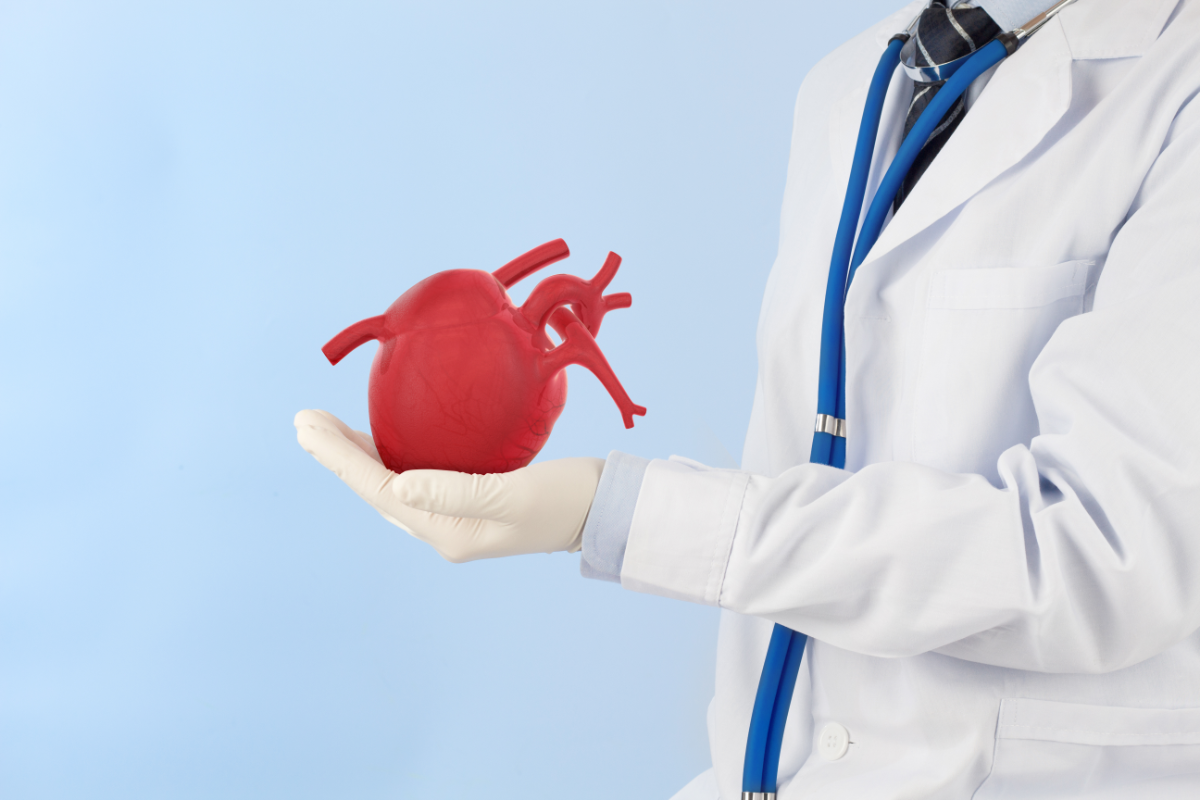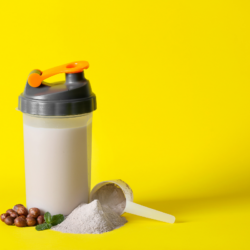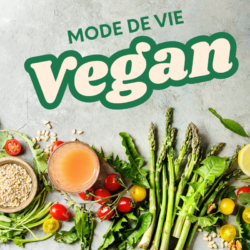Diet and heart health are closely linked, and the choice of diet can have a significant impact on cardiovascular well-being. The vegan diet, characterised by the exclusion of all animal products, is attracting growing interest, not least for its potential beneficial effects on heart health. This plant-based dietary approach offers an abundance of essential nutrients from fruit, vegetables, whole grains and pulses, while eliminating the saturated fats and cholesterol typically associated with animal products.
Essential nutrients in a vegan diet
If well planned, a vegan diet can be nutritionally adequate and provide benefits in the prevention and treatment of certain diseases, including cardiovascular disease. This requires particular attention to certain essential nutrients to ensure adequate nutritional balance.
Proteins
Proteins are essential for maintaining healthy muscles and tissues. In a vegan diet, sources of protein include tofu, tempeh, seitan, legumes (such as beans, lentils and peas), nuts and seeds.
Vitamin B12
Vitamin B12, crucial for the nervous system and the formation of red blood cells, is mainly found in animal products. Vegans should therefore turn to foods enriched with vitamin B12 or consider dietary supplements.
Calcium
Calcium is vital for bones and teeth. Vegans can find calcium in fortified tofu, fortified plant milks, green leafy vegetables such as broccoli and kale, as well as some nuts and dried fruit.
Iron
Iron is essential for haemoglobin formation and reducing fatigue. Plant sources of iron (non-haem iron) include pulses, wholegrain cereals, oilseeds and nuts. Consuming foods rich in vitamin C can improve iron absorption.
Iodine
Iodine, necessary for the production of thyroid hormones, can be a challenge in a vegan diet. Sources include iodised table salt, certain seaweeds and seaweed products with an indicated iodine content.
Fats and cholesterol
Vegan diets, rich in fibre and low in saturated fats, contribute to lower levels of LDL cholesterol and better regulation of blood sugar levels. However, they can lead to an increase in blood triglycerides. It is therefore important to monitor these levels, especially in overweight or obese individuals.
What is the difference between good and bad cholesterol?
Cholesterol, a waxy substance found in the blood, plays a vital role in many bodily functions, but its imbalance can lead to serious health problems, including heart disease. There are two main types of cholesterol: LDL (low-density lipoprotein) and HDL (high-density lipoprotein). Understanding the difference between these two types is essential for maintaining optimum heart health.
LDL is often referred to as the ‘bad’ cholesterol. It transports cholesterol from the food we eat to cells throughout the body. When LDL levels are high, cholesterol can build up in the walls of the arteries, forming plaque that can reduce or block blood flow to the heart and brain. This build-up of plaque is a major risk factor for heart disease and stroke.
HDL, on the other hand, is known as ‘good’ cholesterol. It helps to remove cholesterol from the arteries and return it to the liver, where it is eliminated from the body. A high level of HDL is beneficial and may even help reduce the risk of cardiovascular disease.
Influence of plant proteins
Proteins play a crucial role in the quest for a healthy cholesterol balance. Unlike animal proteins, which are often associated with an increase in LDL levels (the bad cholesterol), plant proteins have a beneficial effect on the lipid profile. Sources of plant protein, such as legumes, tofu and nuts, not only provide high-quality protein but also help to regulate cholesterol, an essential factor in the prevention of heart disease.
Pulses: A rich and healthy source of protein
Pulses, such as lentils, chickpeas and beans, are mainstays of the vegan diet. Rich in protein, they also provide dietary fibre and essential vitamins and minerals. These soluble fibres play an important role in reducing the absorption of cholesterol in the intestine, thereby lowering LDL levels in the blood. Legumes also have a low glycaemic index, which helps to stabilise blood sugar levels, an important factor in heart health.
Tofu: A versatile alternative to animal proteins
Tofu, made from soya, is another highly beneficial source of vegetable protein. Not only is it an excellent alternative to animal proteins, but it also contains isoflavones, phytochemicals that may play a role in reducing LDL. By replacing animal proteins with tofu, you can reduce your intake of saturated fats and cholesterol, while enriching your diet with healthy plant proteins.
Walnuts: Healthy fats for a healthy heart
Walnuts are another important source of vegetable protein. They are also rich in monounsaturated and polyunsaturated fatty acids, which are known for their positive effects on cholesterol. Studies have shown that regular consumption of nuts can help to reduce LDL and increase HDL. In addition, walnuts provide antioxidants and omega-3 fatty acids, which play a role in protecting against heart disease.
How can I maintain a balanced vegan diet?
Maintaining a balanced vegan diet presents some challenges, but with proper planning and understanding, these challenges can be overcome. Here’s a discussion of the main challenges and solutions to ensuring a healthy and diverse vegan diet.
| Challenge | Solution |
|---|---|
| Ensuring Adequate Protein Intake | Include various sources of plant protein such as legumes, tofu and nuts. Vary the sources to cover all the essential amino acids. |
| Prevent Vitamin and Mineral Deficiencies | Eat foods fortified with vitamins B12 and D and minerals such as calcium and iodine. Consider supplements if necessary. |
| Limited dietary diversity | Explore the variety of plant foods. Be sure to include a variety of fruits, vegetables, whole grains, legumes and nuts for complete nutrition. |
| Adapt to Social Contexts | Plan your meals away from home. Check restaurant menus in advance and communicate your dietary requirements at social events. |
| Managing Health Expectations | Take a holistic approach to health. In addition to your vegan diet, include regular physical activity and good stress and sleep management. |
Vegan diet and reduced heart disease
It’s difficult to quantify the results based on what people eat and the impact of diet on their health. There are too many variables that can affect the results and alter the conclusions. That said, a vegan or vegetarian diet can help reduce bad cholesterol levels and thus have a positive impact on heart disease.
However, not everyone decides to become vegan or vegetarian for health reasons. Some people don’t like eating meat, particularly because of the conditions in which animals are reared and the inhumane way in which they are slaughtered. Another reason may be the chemicals injected into animals, such as hens, to help them grow. Finally, there is an environmental issue, as livestock farming requires a lot of resources (land, water). However, for many, the main reason for becoming vegan is a health issue.
They may want to lose weight more quickly or need to lower their cholesterol levels. Research has shown that both of these things are possible with a vegan lifestyle and that vegans are less likely to develop heart disease.
Other studies have concluded that people who avoid meat and animal products are much less likely to become obese. Given that meat tends to be higher in saturated fats and cholesterol, these results are not surprising.
Effects of vegetable fats on heart health
Fats play an essential role in our diet, but not all fats are created equal, especially when it comes to heart health. Vegetable fats, found in foods such as avocados, nuts and vegetable oils, stand out for their beneficial effects on the heart. Unlike saturated fats of animal origin, which are often associated with an increased risk of cardiovascular disease, vegetable fats have a positive impact on our lipid profile.
One of the main benefits of vegetable fats is their ability to modify blood cholesterol levels. LDL, commonly known as ‘bad cholesterol’, is responsible for the formation of plaque in the arteries, leading to diseases such as atherosclerosis. Saturated fats, found mainly in animal products such as red meat and dairy products, are known to increase LDL levels in the blood. Vegetable fats, on the other hand, particularly unsaturated fats, help to reduce LDL. In doing so, they help rid the arteries of harmful deposits, promoting better blood circulation and reducing the risk of heart disease.
Vegetable fats also play a role in increasing HDL, or ‘good cholesterol’. HDL works in the opposite direction to LDL: it helps to remove cholesterol from the arteries and transport it to the liver, where it can be processed and eliminated from the body. A high level of HDL is associated with a lower risk of heart problems, as it helps to keep arteries clean and reduce inflammation.
Avocados, for example, are an excellent source of monounsaturated fats, which have been shown to be effective in reducing LDL. Nuts, such as almonds and walnuts, contain not only healthy fats but also fibre, protein and antioxidants, which together contribute to better heart health. Vegetable oils, such as olive oil, are also rich in heart-healthy monounsaturated and polyunsaturated fats.
It’s important to note that not all vegetable fats are created equal. For example, some processed vegetable oils may contain trans fats, which are harmful to the heart. So it’s essential to choose high-quality, unprocessed vegetable fats to take full advantage of their heart-healthy benefits.
Plant-based sources of Omega 3
Omega-3 fatty acids can help maintain a healthy heart and reduce heart disease, provided they are consumed as part of a healthy, balanced diet.
There are various sources of omega-3 from the plant kingdom:
- Linseed (ground or in oil form)
- Rapeseed oil
- Chia seeds
- Walnuts
The cost of a vegan diet
If you’re considering going vegan, whatever your reasons, you’ll be pleased to know that as well as the potential health benefits, you can also save money. The cost of a vegan diet can vary significantly depending on the types of food you choose: industrial products or fresh produce.
You should be aware that there are several meat substitutes you can add to your daily diet. Once again, the cost of the diet depends essentially on you. If you choose to prepare most of your own meals, you’ll save money by going vegan.
Sources :
- https://pubmed.ncbi.nlm.nih.gov/29496410/
- https://www.ncbi.nlm.nih.gov/pmc/articles/PMC5914369/
- https://pubmed.ncbi.nlm.nih.gov/31567003/
- https://pubmed.ncbi.nlm.nih.gov/27886704/
- https://pubmed.ncbi.nlm.nih.gov/24871675/
- https://pubmed.ncbi.nlm.nih.gov/12826029/







